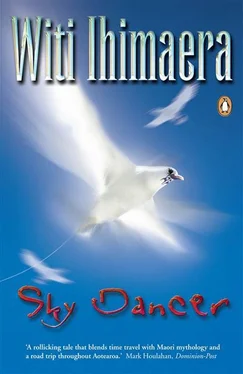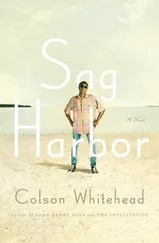“Oh what’s the use,” Skylark said to herself.
Muttering crossly, she got up from her chair and stomped over to the homestead to see Hoki. How could she chill out with all this stuff swirling around about wars between birds and premonitions of a doomsday that would come with the next dawn. At the doorway she bumped into Bella coming out with that look on her face. She gave a brief nod to Skylark and yelled back over her shoulder.
“I am not getting all gladwrapped in that old dress!”
Uh-oh, two more people having a bad day, Skylark thought. I may as well throw a triple.
She walked into the room. Hoki looked up.
“So you’re next, are you?” Hoki asked. She had a needle and thread in her hand, and was stabbing tiny stars onto a black dress.
“Don’t take your anger out on me,” Skylark said.
“Why shouldn’t I? Isn’t anything getting through to you? About the rising of Venus tomorrow morning? The battle of the birds that led to the prophecy?” Hoki’s fingers were simply flying over the dress. One false move and she could prick herself. “You know, it happened not far from here. Down there, just below Manu Valley, that’s where Kawau’s river lagoon was.”
Hoki pointed to a place halfway between valley and sea.
She began to give Skylark the Final Lesson.
“On the morning the battle began,” Hoki said, “all the seabirds were gathered around the three offshore islands. There were so many of them that they smothered the sea completely like a white carpet. All eyes were looking toward Karuhiruhi’s fortress. They were waiting for the dawn to tip the islands with the red colour of blood —”
Remarkable, really, how quickly the sun came up on that morning. The Great Book of Birds says that the fireball erupted with a hiss from the sea, ascended quickly, its light cutting quickly across the black night water. The surface of the sea became a mirror. The dawn travelled fast, and when it glowed upon the seabirds, that unholy Sea of White Feathers, it wanted to turn back, to retreat from such unnatural order. But it was too late. Already the sun’s forward edge had drenched the offshore islands with crimson.
Kee- law, kee -law. Kaa. Kaa. The Day of Days has come.
The sun flared, burning all colour away, and it was day. There was no turning back. Karuhiruhi stood on the ramparts of the island fortress. Beside him was Areta, her baby son in her wings. On either side of the royal pair were the co-conspirators Karoro, Toroa, Taranui and Parara. The seabird army opened their beaks and began to hiss, creating a whirlwind of menace.
Karuhiruhi stepped forward. “Today, my fellow birds of the sea, is our day of liberation.” The hissing grew louder. “Today we overturn the Great Division. If the Lord Tane disapproves, then let me be the first to be struck down. Oh, Lord Tane, do your will.”
Karuhiruhi offered his breast to the heavens. But where was the bolt of lightning? Where was the death-dealing blow? There was none. None! The hissing became ecstatic, triumphant, ascending into the Heavens. “The Lord Tane has spoken,” Karuhiruhi cried. “Let the war begin.”
As one the seabird army lifted from the sea. They beat the air, keeping formation, and watched as Karuhiruhi and Karoro took positions at the spearhead of the seashag squadron.
“Forward — fly !”
“Meantime,” Hoki said, “Chieftain Kahu of hawks was on forward surveillance. He sent his daughter, the beautiful Kahurangi, back with the message that the seabirds were on the wing.
“‘Kia hiwa ra, kia hiwa ra!’ Kahurangi shrilled. ‘Be alert! Be watchful! Be alert on this terrace! Be alert on that terrace!’
“Duly forewarned, the manu whenua were in position. Chieftain Pitoitoi of robins was the first to see the black and grey cloud arising from the sea. He had never seen such a phantom menace and, for a moment, his voice almost deserted him. His throat seized up, so he took a quick sip of nectar, gargled and that did the trick. ‘Pitoi toi toi!’ he called. ‘They’re coming!’ Hearing his call, Chieftain Koekoea of the long-tailed cuckoos, limbered up for action. How proud he was that he had drawn the straw to be the first challenger. How lucky, too, that he happened to be in Aotearoa and not wintering over in the Marquesas. Koekoea loved a good fight. Psyched up for action, he took to the air —”
Chieftain Tui saw and heard the manu whenua cheer as Koekoea streaked upward. He saw the light flash on Koekoea’s long reddish brown tail feathers and watched with approval as he climbed swiftly to a height that would give him advantage. There, Koekoea took an aggressive position, flying backwards and forwards before the approaching seabirds.
Karuhiruhi sighed with contempt. He turned to Toroa, the albatross chieftain. “Despatch that bothersome bird,” he said.
Toroa nodded his head and, propelled by his powerful wings, soared up to engage Koekoea.
At the enemy’s approach, Koekoea felt battle excitement surging through his loins. He knew it was imperative for morale that the landbirds draw the first blood. Koekoea dived, planing down from the sky, calling his wild, long, drawn-out cry: “Shweesht kik-kik-kik-kik ! Come no further! Kik-kik-kik-kik !”
For a moment Toroa hesitated. He recalled the times in the past when he and Koekoea had encountered each other during the long-tailed cuckoo’s migratory flights between New Guinea and New Zealand. He had forgotten how evil-looking Koekoea, a carnivore and predator, was.
Toroa’s hesitation was his undoing. He stalled and, stationary, became an ideal target.
“Cross the border between land and sea,” Koekoea said, “and you do so at your own peril.” He moved his head in a sinuous reptilian manner, drilling Toroa with his baleful yellow eyes. Then he struck. With a cry, Toroa reeled back, air spilling from his wings.
“I-ah-ha-haa!” Koekoea screeched in triumph. He had done it. He had drawn the first blood. High in the sky he heard Kahu, chieftain of hawks, calling, “Well done, you of the long-tail tribe which braves the sky.”
Toroa returned to the seabird war party. Karuhiruhi was furious with him and slashed the albatross’s face with his beak, drawing blood.
“But you said our attack would be a surprise,” Toroa said. “You never said that the landbirds would put up any defence.”
Karuhiruhi whistled scornfully. “You call one long-tailed cuckoo a defence?” Before he could pour more scorn on Toroa’s pathetic display, Karoro plucked at his left wing: “Sire, the second challenger comes.”
Karuhiruhi looked to the front and almost fell out of the air with laughter. Spinning and twittering through the sky came Chieftain Piwakawaka of the fantail clan.
“Do my eyes deceive me?” Karuhiruhi asked. “Is that really a bird in front of me?”
Now it must be admitted that a fantail — at best, the size of a human hand from the wrist to outstretched fingertips — does not convince as a worthwhile opponent. But Piwakawaka had drawn the second straw and was determined to claim the right given to him, whatever others might say. “You can’t possibly send him,” Kawau had moaned. “He will be made a mockery of by the seabirds.” Te Arikinui Kotuku had disagreed and Te Arikinui Huia, who knew a real bird when she saw one, intoned an ancient proverb. “Ahakoa he iti,” she said, “he pounamu.” Roughly translated, Huia’s words meant size wasn’t everything.
Chieftain Tui therefore watched with some admiration as Piwakawaka flitted up to meet the army of manu moana. He raised a cheer for the valiant fantail. “Although our second challenge will be unequal, similar to David’s battle with the giant Goliath, what Piwakawaka lacks in stature he makes up for in bravery — or foolhardiness. Go, Piwakawaka! Stick it to the seabirds.”
Читать дальше












